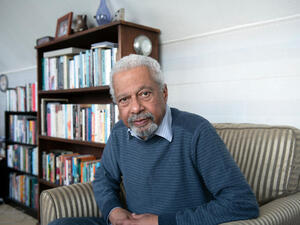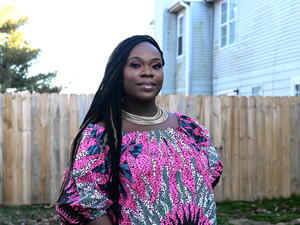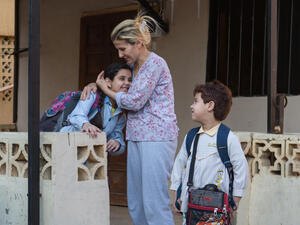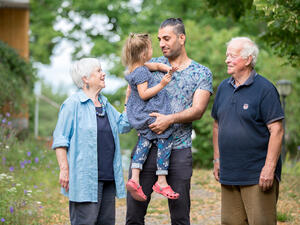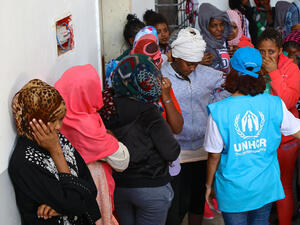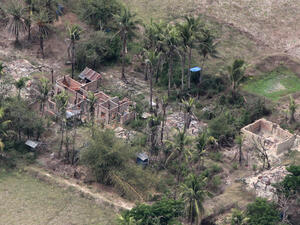ExCom: UNHCR official says criminalizing search for asylum is no answer
ExCom: UNHCR official says criminalizing search for asylum is no answer

Assistant High Commissioner Erika Feller addresses protection concerns at the annual meeting of UNHCR's Executive Committee in Geneva.
GENEVA, October 6 (UNHCR) - The UN refugee agency's top protection official on Wednesday told delegates to the annual meeting of UNHCR's governing body that criminalizing the search for asylum was not a solution.
Assistant High Commissioner for Protection Erika Feller, in her annual address to the Executive Committee (ExCom) in Geneva, warned that such an approach "has serious protection consequences for refugees and breeds its own secondary problems for states, including racism and xenophobia."
According to Feller, asylum-seekers suffer hardship in detention on every continent. "It has reached the point in some countries where there are actually more due process safeguards regulating detention of criminals than of asylum-seekers, the very large majority of whom have committed no crime."
Feller told ExCom members that while progress had been made in some areas over the past decade, "the world for many millions remains a very insecure place." Sadly, she said, "UN Security Council resolution 1325 on women, peace and security is still honoured more in the breach than in the practice."
Noting that hazard is "in many situations an ever present, proximate and lethal threat," Feller told the gathering about a pregnant Somali woman who was forced to return to Mogadishu with her nine-year-old son. A few weeks after arriving back in the beleaguered Somali capital, the woman was permanently incapacitated in a mortar attack that left her son seriously injured and her newborn child dead.
Looking back over the past decade as UNHCR nears its 60th anniversary in December, the Assistant High Commissioner said she had witnessed some positive developments. She cited progress in seemingly intractable situations, noting that the internal displacement in northern Uganda has found some level of resolution with 1.7 million people returning home.
On a global level, she said 24 countries now offer increased numbers of resettlement places, with 84,000 refugees benefitting in 2009. She cautioned that this increase is still "insufficient . . . when measured against need" with the "reality [being] that for every 100 refugees in need of resettlement, only 10 are resettled each year."
Even in areas where the tradition of asylum is a time honoured tradition, Feller noted a deterioration in recent years. She said that border areas have become particularly dangerous with "appalling incidents of kidnappings of migrants, including asylum-seekers, for the purpose of extortion, accompanied by serious human rights abuses, notably rape, torture and murder."
During this week's five-day ExCom meeting, Feller has chosen to focus attention on the issue of strengthening the rule of law to ensure the protection of people of concern to UNHCR. "Many, if not most, refugees return to countries emerging from protracted conflict, where peace is fragile at best," she said, noting the importance of developing functional national protection structures and of housing rights to ensure sustainable return and peaceful reintegration.
According to Feller, "refugee education is everywhere a challenge." She called upon ExCom member states to cover funding shortfalls that would enable access education. "Education is both a human right and a protection issue - children who go to school usually escape recruitment by armed groups, while "girls who drop out of school are often forced into early marriage," she said.
Looking forward to the 50th anniversary of the Reduction of Statelessness Convention in August, Feller called for an increased rate of accession, warning that there is a risk that it could take another 50 years before there could be a truly "global assumption of responsibility to address the problem of statelessness." She cautioned that newly drafted nationality legislation includes "arbitrary deprivation of nationality on the grounds of gender, of national origin or because of disapproved marriages."
Concluding on a positive note, the Assistant High Commissioner said she hoped a ministerial meeting next year to commemorate UNHCR's landmark anniversary and the 50th anniversary of the statelessness convention will lead to "commitments which will enable this organization and its mandate to continue being the difference between life and death, danger and risk, desperation and solutions that it actually represents for millions."
By Sybella Wilkes in Geneva

